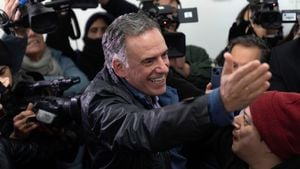China has been tightening its grip on the foreign travel of its citizens, particularly professionals such as teachers, doctors, civil servants, and bankers, introducing stringent controls to monitor and restrict their movements abroad. This decision has triggered concerns among many about the extent of governmental power over personal freedoms.
The Chinese Communist Party (CCP) has been increasingly vigilant about overseas travel since the global pandemic reshaped travel norms and strategies. A heightened scrutiny system has emerged, ostensibly under the guise of national security, which impacts even those with no prior confidence issues. Recent reports indicate this campaign correlates with enhanced domestic propaganda efforts aimed at glorifying China's successes on the world stage, contrasting the restrictive measures faced by its own citizens.
Professionals who typically travel abroad for educational, medical, and diplomatic purposes are now finding their foreign movements closely monitored. The Ministry of Foreign Affairs recently established protocols requiring comprehensive disclosures of travel plans, along with justification for the visits, under the pretext of enhancing national security and maintaining social stability. Such guidelines have raised alarm among many who view this as part of the CCP's broader agenda to consolidate control over the populace.
The increased scrutiny is particularly evident among educators and healthcare professionals. Teachers are experiencing substantial hurdles as they attempt to participate in international educational conferences or exchange programs. Reports of travel applications being denied or delayed without proper explanation have become increasingly common, leading to frustrations among educators who have dedicated their careers to fostering international collaboration.
Healthcare professionals face equally rigorous limitations. Doctors and medical researchers wishing to attend international medical conventions now find themselves entangled in bureaucratic red tape. A local physician recently described his experience as akin to “jumping through hoops.” His application was met with numerous rejections, each time asking for more detailed rationales on why his presence at such international gatherings would benefit the country.
Meanwhile, civil servants and bankers, two groups heavily intertwined with foreign investment and international relations, are also seen as suspect. Bankers, particularly those involved with foreign transactions, must now submit detailed financial plans and explain their travel objectives. Critics suggest these measures not only impede professional engagements but also reflect China's growing fear of outside influence, as the CCP asserts its authority over those with substantial international ties.
International relations experts caution these restrictions could have long-term ramifications on China’s global standing. A weakened ability for scholars and medical professionals to engage with their peers worldwide could result in hindered growth and innovation. Despite growing domestic pressures for reform and the desire for more open international relations, the CCP appears reluctant to loosen its grip on citizen travel.
Adding to the clandestine nature of these operations is the CCP’s deployment of surveillance technology, which extends even to the travel arrangements of its citizens. According to various reports, many prospective travelers have found their movements monitored through smartphone applications and travel history records. This approach raises ethical concerns surrounding privacy as citizens are subject to scrutiny both at home as well as abroad. Observers argue such actions could prevent scholars and professionals from freely communicating ideas and innovations, contradicting the very spirit of global collaboration.
The measures have faced backlash both domestically and internationally, with human rights advocates decrying the impact on academic freedom and personal liberties. The United Nations has frequently highlighted the necessity for governments to respect and preserve citizens' freedoms, emphasizing the detrimental effects of excessive surveillance on individual rights.
China's growing reputation as one of the world's most restrictive regimes is upheld not only by travel restrictions but also through the CCP's broader crackdown on dissent and expression at home. Authorities have leveraged the narrative of potential threats to justify these restrictions, shaping nationalist sentiments to minimize backlash.
The trend of tightening travel controls among Chinese citizens raises eyebrows among global leadership, inviting questions about the future of international diplomacy with China. U.S. officials, for example, have voiced concerns about the growing isolation of Chinese intellectuals, doctors, and business professionals, believing this could infringe upon international cooperation on pressing issues like health crises and technological advancements.
Some experts claim this retreat from openness not only alienates professionals from gaining international experience but also poses potential risks for China's future economic growth as industries more dependent on global partners may suffer. Tensions have only heightened over international perceptions of China, where open dialogues have been replaced with suspicion.
The restrictions may also represent the CCP’s response to perceived failures of its foreign policy, as issues such as the South China Sea disputes and Taiwan continue to elicit international scrutiny and dissent. Some believe the travel crises are meant to divert the public's attention from these pressing geopolitical issues and instill fear of foreign influence within the population.
Reports indicate certain categories of citizens are exempt from these travel controls, with those deemed especially loyal to the state receiving preferential treatment. A two-tiered travel system is reportedly on the rise, leading to fears of increased discrimination among professionals based on their political affiliations and history with the regime.
Despite the challenges, many professionals remain undeterred, advocating for international exposure as key to preventing stagnation within their fields and improving standards of practice back home. Organizations both inside and outside China are actively working to provide resources and support to those still wishing to pursue opportunities abroad.
The situation continues to evolve as more citizens voice their frustrations. Furor over restrictions has ignited discussions among professionals on alternative methods to engage with global communities. Teachers, for example, have started creating virtual exchange programs as a temporary workaround to physical barriers. There’s hope among many citizens for eventual reforms to be enacted to ease restrictions on travel, amid rising international collaborations aimed at sharing knowledge on pressing global issues.
China's tightened control over foreign travel is symbolic of broader governmental policies aimed at restricting freedoms and tightening its grip on civil society. These circumstances resurrect conversations surrounding the balance between security and individual liberties, highlighting the need for global awareness as developments continue to unfurl. With debates heating up over the impact of such restrictions, it is evident the repercussions will extend beyond China's borders, potentially reshaping international relations.



